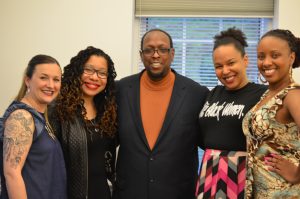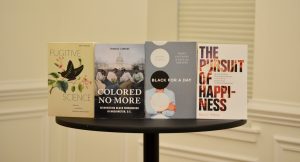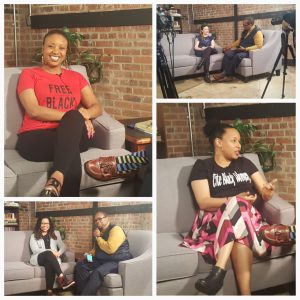Home » Posts tagged 'knowledge production'
Tag Archives: knowledge production
Co-Creating Knowledge: An Intellectual Reunion of Duke Alumnae

More than 50 people gathered in the Ahmadieh Family Conference Room on Tuesday evening, April 24, for a special meeting of Duke’s Introduction to African & African American Studies class, taught this spring by department chair Mark Anthony Neal.
Professors Britt Rusert, Treva Lindsey, Alisha Gaines and Bianca Williams are Duke Ph.D.’s who each had a book on blackness published in the past year. Neal made those books assigned reading for the spring class and invited the alumnae back to campus to speak with students and to revisit their formative years where the seeds for their intellectual pursuits were planted.

The symposium, “Black Women, Black Studies, Knowledge Production,” was entirely curated by graduate and undergraduate students in a demonstration of vertical learning. English Ph.D. student and teaching assistant Israel Durham designed the program for the 2.5 hour symposium, allowing each student an opportunity to converse with the authors.
The students, divided into small groups, passed a microphone and peppered each alumna with thoughtful questions related to their research as well as their scholarly approach and process. View Photos
Wearing a “#CiteBlackWomen” t-shirt, Williams told students that what they were experiencing was special and a testament to the “brilliant teaching” at Duke.
“You get to co-create. You also know things. You have useful questions. You know enough to engage scholars,” she told students.
“I just want you to know this isn’t normal. This doesn’t usually happen,” Williams said, noting the generosity of professors like Neal and Wahneema Lubiano, an associate professor and mentor to the women, who also attended and joined the women for the last panel of the evening.
“Wahneema would write down every foolish thing we said,” Williams remembered of her time as a student. “It might not have been what I said, but [she knew] what I meant. She would take our nugget, add to it, and give it back… That is generosity and it’s not the norm. After being in other environments, I want you to know this is a gift that we all received.”
Lindsey agreed, reminiscing about the familial kinship she felt in her cohort and with the faculty.
“The faculty believed in us as knowledge producers,” Lindsey said. “I wouldn’t have made it without Wahneema and MAN because of the confidence they instilled in us to be voices, but also to be on the front lines when things went down here,” Lindsey said. “That is the type of faculty member I want to be.”
Gaines, who is interested in black popular culture and reality television, said Black women gave her a way to imagine herself as a scholar and a thinker, especially as an undergraduate student at Spelman.
“I’m a good teacher because I have had good models for it,” Gaines said.
Rusert remembers the freedom to be intellectually adventurous while she was a student at Duke.
 “I was 22 years old and remember being in that class (The Post-Black Aesthetic). MAN took our ideas seriously. I remember being like ‘wow!’ This professor really wants to hear what I think,” she said, adding that the interdisciplinarity of the department prepared her for study in her field in unexpected ways.
“I was 22 years old and remember being in that class (The Post-Black Aesthetic). MAN took our ideas seriously. I remember being like ‘wow!’ This professor really wants to hear what I think,” she said, adding that the interdisciplinarity of the department prepared her for study in her field in unexpected ways.
Also, she said that she’s been able to confront Southern bias as a professor now teaching in New England.
“I am really grateful to have had time training in the South because I can correct some misunderstandings,” Rusert said.
Rusert is an assistant professor in the W. E. B. Du Bois Department of Afro-American Studies at University of Massachusetts, Amherst, is the author of Fugitive Science: Empiricism and Freedom in Early African American Culture and co-editor of W. E. B. Du Bois’s Data Portraits: Visualizing Black America, a collection of data visualizations Du Bois contributed to the 1900 Paris Exposition and forthcoming from Princeton Architectural Press in fall 2018. She earned an English Ph.D. and certificate in feminist studies from Duke in 2009. She is beginning a new monograph about William J. Wilson’s African-American Picture Gallery (1859), a text that imagines the first museum of black art in the United States.
Lindsey is an associate professor and the Director of Undergraduate Studies of Women’s, Gender, and Sexuality Studies at The Ohio State University. She authored, Colored No More: Reinventing Black Womanhood in Washington D.C., a Choice 2017 “Outstanding Academic Title.” Recently dubbed #ProfessorBae by Bossip magazine, Lindsey’s research and teaching interests include African American women’s history, black popular and expressive culture, black feminism(s), hip hop studies, critical race and gender theory, and sexual politics. She earned a master’s degree and a Ph.D. in history at Duke.
A lifelong Michael Jackson fan, Alisha Gaines received a Ph.D. in English from Duke and also received the graduate certificate in African and African American Studies. She is assistant professor of English at Florida State University where she won a university-wide Undergraduate Teaching Award in 2017. Her first book, Black for a Day: Fantasies of Race and Empathy, was published in Spring 2017. Inspired by the short-lived F/X reality tv show “Black.White,” the book constructs a genealogy of white liberals who temporarily “become” black under the alibi of racial empathy. As such, Gaines has a love/hate relationship with Rachel Dolezal.

An associate professor of anthropology at The Graduate Center, City University of New York, Bianca Williams is also Black Lives Matter organizer, co-founding the Denver chapter. She earned a bachelor’s degree and a Ph.D. in cultural anthropology at Duke, and a graduate certificate in African and African American Studies. Her book, The Pursuit of Happiness: Black Women, Diasporic Dreams, and the Politics of Emotional Transnationalism, how African-American women use international travel and the Internet as tools for pursuing happiness and leisure; creating diasporic relationships; and critiquing American racism and sexism. Central to her research is the question, how do Black women develop strategies for enduring and resisting the effects of racism and sexism, while attempting to maintain emotional wellness?
Neal, host of weekly webcast Left of Black, interviewed the four women about their work earlier that day in the John Hope Franklin Center studio for upcoming episodes of the show. An appearance on Left of Black has increasingly become a rite of passage for a network of young black studies scholars.
“A cohort experience becomes part of our building of knowledge so the production part is apparent. We’re making it as craft, it’s not an arcane thing,” Lubiano, an associate professor of literature and a long-time Duke faculty member, told students at the symposium. “We are actively participating in creating knowledge, thinking about the students and making them central to the work early on.
“I’ve seen students go from undergrad to full professorships,” she said. “Making knowledge is not a finished ‘house,’ we’re always building. It’s important to make your fracturing speak to someone else’s fracturing. We take seriously the process of remaking knowledge.”




